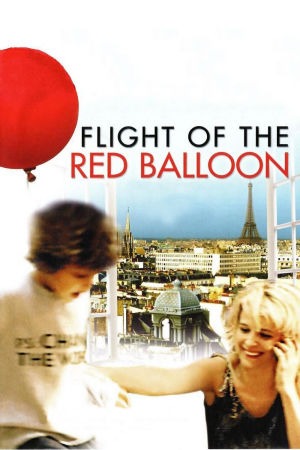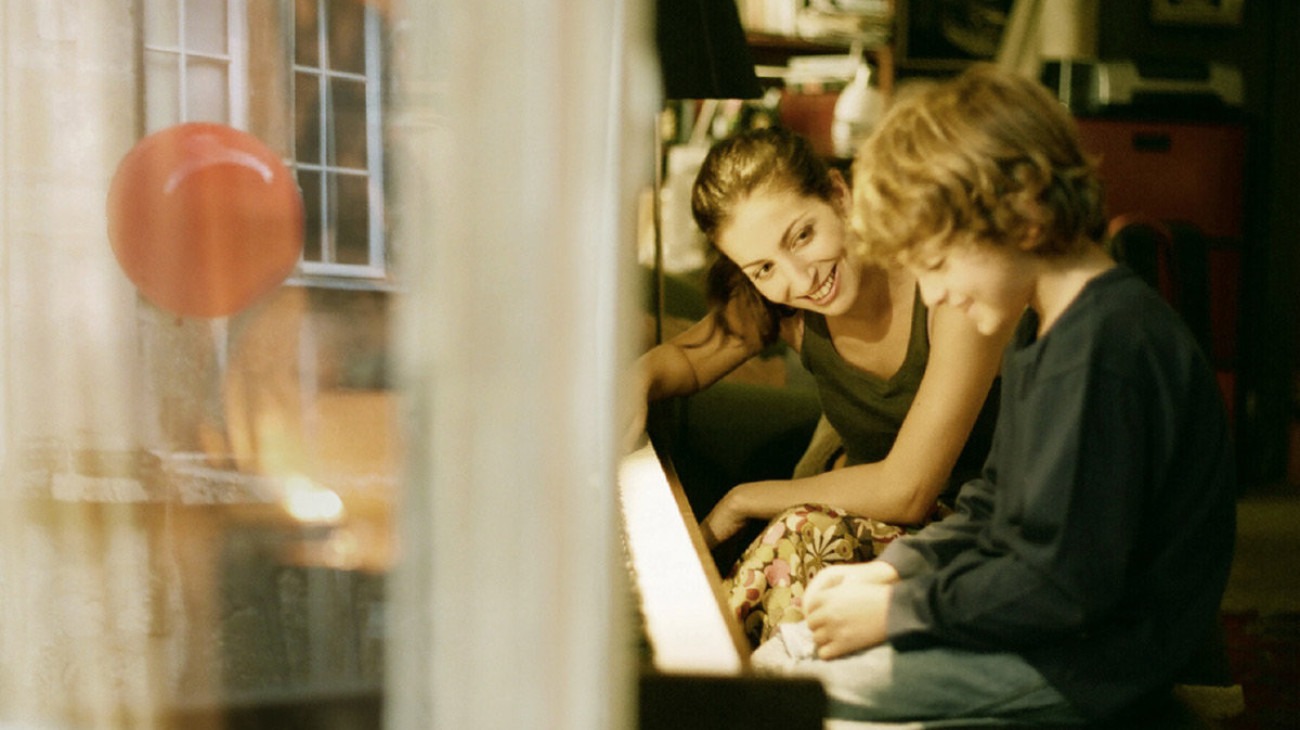
The 43rd Chicago International Film Festival
I haven't seen all that many films by Hou Hsiao-Hsien, but based on what I have seen, Flight of the Red Balloon qualifies as his most action-packed work yet, given that it has a plot for pretty much all of its running time. I snark, but from love.
More damningly, I haven't ever seen Albert Lamorisse's much-loved children's film from 1956, The Red Balloon, of which the Hou film is...not a remake. I am quite confident about that. It's something much harder to quantify: it treats upon the earlier film as a touchstone, as an inspiration, and a reference, and I'm pretty sure that "getting" this film means having more knowledge of the original than knowing it exists. Still, I'll do what I can.
In many ways, Flight of the Red Balloon showcases some of Hou's most obvious traits: long, still shots; frames within frames; stories that stress the bleeding of the past into the present. But as far as I know - and I don't know very far - he's never made a film so taken up with the matter of filmmaking itself. And it does it in a wildly autobiographical way, too: one of the film's three leads is Song (played by newbie Fang Song, and the "character is named after the actor" thing can't be a coincidence, either), a recent arrival from China to France, who spends her free time making a movie that is not quite a remake of The Red Balloon. That's not nearly so overdetermined as I've made it sound; in fact it's really quite elliptically expressed.
Song is employed as the nanny to Simon (Simon Iteanu), the not-quite-abandoned son of Suzanne (Juliette Binoche), a voice artist in a puppet show (specifically, a retelling of an old Chinese legend). The bulk - in fact, the entirety of the film consists of watching some iteration of these three characters going on about their lives while a red balloon that may or may not be part of Song's movie drifts around just at the periphery of Simon's vision.
There's a lot going on, and for the patient viewer I think most of it is obvious, but one of the things that I particularly want to bring up is that the Chinese woman is interpreting a classically French film, and the French woman is interpreting a classically Chinese story. Fluidity of culture is another major touchstone of Hou's cinema, along with the enjambment between the modern and the classical, and the way those themes cross each other and build themselves up together is very elegant here.
Of course, one could have a perfectly satisfying reading without recourse to anything more than the story of a family in strife: Suzanne is not "neglectful" exactly, but she certainly can't attend to Simon as much as either of them would like, and the boy, without his mother or his much-beloved half-sister, has turned inward, into a world of the PS3 and Game Boy. Song casts him in her film and begins to expand his mind a little bit that way; at the start of the film, he has never heard of The Red Balloon and at the end, he is captivated by the mystery of his very own red balloon.
Which is not to discount Suzanne's own arc, which is beautiful to behold: Binoche is more exciting than she has been in years as the frenzied single mom with the gaudy bleached hair and wrinkled clothes. She's always in a hurry - in distinct contrast to the slow-moving Song - always flustered. It's very close to a career-best performance, and that's before we consider the marvelous work the actress does in the puppetry voice-over scenes; it's almost enough to make you wish that Binoche would do such work full-time.
Hou's camera captures the ebb and flow of these characters casually, but not without a great deal of sensitivity. Many - perhaps even most - of the scenes take place in the very crowded living room/kitchen where the three characters collide like electrons, and simply watching the actors move through the frame, fully exploring the way that the setting affects the characters, is engrossing. Taxing on one's patience, doubtlessly - but for those on the right wavelength (and there's certainly no shame in finding Hou's films too slow for their own good), this is magisterial cinema.
9/10
More damningly, I haven't ever seen Albert Lamorisse's much-loved children's film from 1956, The Red Balloon, of which the Hou film is...not a remake. I am quite confident about that. It's something much harder to quantify: it treats upon the earlier film as a touchstone, as an inspiration, and a reference, and I'm pretty sure that "getting" this film means having more knowledge of the original than knowing it exists. Still, I'll do what I can.
In many ways, Flight of the Red Balloon showcases some of Hou's most obvious traits: long, still shots; frames within frames; stories that stress the bleeding of the past into the present. But as far as I know - and I don't know very far - he's never made a film so taken up with the matter of filmmaking itself. And it does it in a wildly autobiographical way, too: one of the film's three leads is Song (played by newbie Fang Song, and the "character is named after the actor" thing can't be a coincidence, either), a recent arrival from China to France, who spends her free time making a movie that is not quite a remake of The Red Balloon. That's not nearly so overdetermined as I've made it sound; in fact it's really quite elliptically expressed.
Song is employed as the nanny to Simon (Simon Iteanu), the not-quite-abandoned son of Suzanne (Juliette Binoche), a voice artist in a puppet show (specifically, a retelling of an old Chinese legend). The bulk - in fact, the entirety of the film consists of watching some iteration of these three characters going on about their lives while a red balloon that may or may not be part of Song's movie drifts around just at the periphery of Simon's vision.
There's a lot going on, and for the patient viewer I think most of it is obvious, but one of the things that I particularly want to bring up is that the Chinese woman is interpreting a classically French film, and the French woman is interpreting a classically Chinese story. Fluidity of culture is another major touchstone of Hou's cinema, along with the enjambment between the modern and the classical, and the way those themes cross each other and build themselves up together is very elegant here.
Of course, one could have a perfectly satisfying reading without recourse to anything more than the story of a family in strife: Suzanne is not "neglectful" exactly, but she certainly can't attend to Simon as much as either of them would like, and the boy, without his mother or his much-beloved half-sister, has turned inward, into a world of the PS3 and Game Boy. Song casts him in her film and begins to expand his mind a little bit that way; at the start of the film, he has never heard of The Red Balloon and at the end, he is captivated by the mystery of his very own red balloon.
Which is not to discount Suzanne's own arc, which is beautiful to behold: Binoche is more exciting than she has been in years as the frenzied single mom with the gaudy bleached hair and wrinkled clothes. She's always in a hurry - in distinct contrast to the slow-moving Song - always flustered. It's very close to a career-best performance, and that's before we consider the marvelous work the actress does in the puppetry voice-over scenes; it's almost enough to make you wish that Binoche would do such work full-time.
Hou's camera captures the ebb and flow of these characters casually, but not without a great deal of sensitivity. Many - perhaps even most - of the scenes take place in the very crowded living room/kitchen where the three characters collide like electrons, and simply watching the actors move through the frame, fully exploring the way that the setting affects the characters, is engrossing. Taxing on one's patience, doubtlessly - but for those on the right wavelength (and there's certainly no shame in finding Hou's films too slow for their own good), this is magisterial cinema.
9/10






